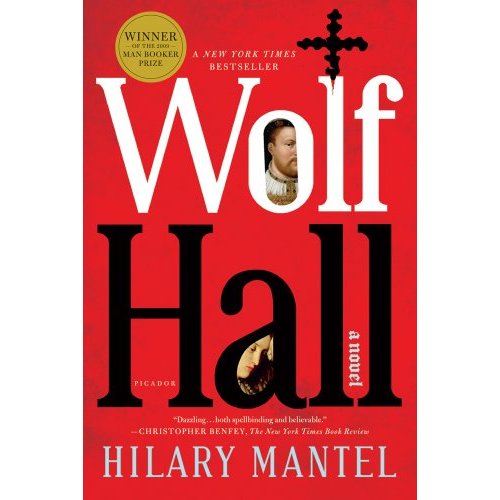Book review Tuesday: Wolf Hall, by Hilary Mantel
I never thought I was a historical fiction lover until I discovered Hilary Mantel. She is a master at resurrecting worlds from the past, breathing life into them, and making well-told stories compelling in new ways.
Wolf Hall is the first in a series of historical novels by Mantel focusing on Thomas Cromwell, who was an advisor to Cardinal Thomas Wolsey and then, once Wolsey had died, an advisor to King Henry VIII during that exciting period when the King was having some — issues, shall we say — with his wives, Katherine of Aragon and Anne Boleyn — and Jane Seymour and Anne of Cleaves and, well, the list goes on. The second book in the series, which I’m currently tearing through, is Bring Up the Bodies. The third book has not yet been published, but if it follows in the footsteps of the first two, it will undoubtedly win the Man Booker Prize immediately upon its release. That’s right, both Wolf Hall and Bring Up the Bodies won the Man Booker Prize – Wolf Hall in 2009, Bring Up the Bodies in 2012. Impressive, huh?
I had heard some talk about Mantel’s books over the past year but wasn’t compelled to read any of them until I read this fascinating (and beautifully written) piece in the New Yorker about Mantel and her work. I dare you to read that piece and not want to devour all of Mantel’s books immediately. So, I bought Wolf Hall, and, once I had finished the long line of books ahead of it in my Kindle queue, I read it in a few days. It did not disappoint.
I won’t try to sum up the plot of the book – it begins in 1500 when Thomas Cromwell is still a child, growing up in fear of his abusive father, skips ahead twenty-seven years to when Cromwell is advising Wolsey, and ends in July 1535, with the execution of Thomas More. A lot of stuff happens: political dealings, divorce, torture, infidelity, love, betrayal. At the center of the story is Cromwell, a brilliant political actor who you can’t help but root for. And as Mantel traces Cromwell’s rise to power, she tells, through very human characters, a story about the changing face of England: its religious life, its politics, its monarchs, its populace. The sense of place in this novel is so palpable, I feel that I understand England better now for having read it. One of my favorite parts was the opening of the chapter entitled An Occult History of Britain, 1521-1529:
Once, in the days of time immemorial, there was a king of Greece who had thirty-three daughters. Each of these daughters rose up in revolt and murdered her husband. Perplexed as to how he had bred such rebels, but not wanting to kill his own flesh and blood, their princely father exiled them and set them adrift on a rudderless ship.
Their ship was provisioned for six months. By the end of this period, the winds and tides had carried them to the edge of the known earth. They landed on an island shrouded in mist. As it had no name, the eldest of the killers gave it hers: Albina.
When they hit shore, they were hungry and avid for male flesh. But there were no men to be found. The island was home only to demons.
The thirty-three princesses mated with the demons and gave birth to a race of giants, who in turn mated with their mothers and produced more of their own kind. These giants spread over the whole landmass of Britain. There were no priests, no churches and no laws. There was also no way of telling the time.
After eight centuries of rule, they were overthrown by Trojan Brutus.
The story goes on: the Trojans defeated the giants, “led by Gogmagog,” who was thrown into the sea, and later, the Tudors, descendants of Brutus, entered the picture. “Beneath every history, another history.”
The most impressive facet of Mantel’s writing, to me, is how she humanizes historical figures, giving them complex motives and desires, making us rethink who is sympathetic and who is unsympathetic. For instance, one of the prominent characters in Wolf Hall is Thomas More, the man who refused to accept Henry as head of the Church in England after he sought to divorce Katherine of Aragon and marry Anne Boleyn. Near my hometown, there is a church named for More, who was canonized by the Catholic Church in 1935, making him St. Thomas More, but I didn’t know much about him before reading this book. As Mantel portrays him, More was a petty man, and a bit of a sadist who delighted in torturing heretics. He was also rather a coward, but he embraced his death as a martyr out of stubbornness and a twisted sort of self-interest. In Wolf Hall, Thomas More is in many ways Thomas Cromwell’s foil. Although they are both lawyers, men who study texts, Cromwell is a questioner, someone whose views evolve as he ages, whereas More is rigid, determined to hew to the rules of the Church. I loved this passage describing Cromwell’s thoughts about More, who he thinks of as “some sort of failed priest, a frustrated preacher:”
He never sees More – a star in another firmament, who acknowledges him with a grim nod – without wanting to ask him, what’s wrong with you? Or what’s wrong with me? Why does everything you know, and everything you’ve learned, confirm in what you believed before? Whereas in my case, what I grew up with, and what I thought I believed, is chipped away a little and a little, a fragment then a piece and then a piece more. With every month that passes, the corners are knocked off of the certainties of this world: and the next world too. Show me where it says in the Bible, “Purgatory.” Show me where it says “relics, monks, nuns.” Show me where it says “Pope.”
I love that passage because it’s a perfect crystallization of the conflict between two common worldviews. The book is full of these sharp observations of life and human interaction and memory. And yet, nonetheless, the plotting is perfect and the book moves at a brisk clip.
In short, Mantel’s novels are breathtaking and wonderful. Even if you’re not a historical fiction fan, these books might change your mind.


I’ve heard GREAT things about her and am glad to add your recommendation to the list. Have you read Ken Follet’s century trilogy (only the first two are out)? They are a commitment, but incredibly well-researched historical fiction that felt real and I loved the first two. I didn’t like one of his other books that I tried *quite* as much though it was equally well researched.